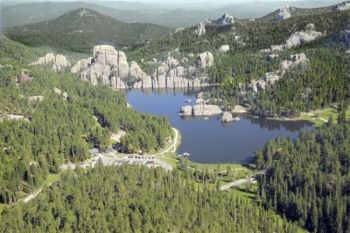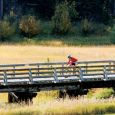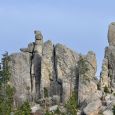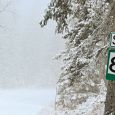The Gift of South Dakota
Subscriptions to South Dakota Magazine make great gifts!
Subscribe today — 1 year (6 issues) is just $29!
Trees Don't Pay Taxes
Jul 2, 2012
If I had to list the many blessings that I enjoy as a citizen of these United States, national and state parks would rank high on that list. I fell in love with the Ozark National Forest when I was a teenager and I continue to visit Gunner Pool Recreation Area nearly every year. This is a deep canyon cut by Sylamore Creek, a clear, trout-laden stream coursing around moss-encrusted stones the size of houses.
Shortly after I set down roots in South Dakota, I discovered the Black Hills and the Badlands. Several years ago two of my NSU colleagues and I went backpacking in Wind Cave National Park. While walking across a vast field of grass a foot and a half tall, Professor Dias tripped over a railroad spike that someone had driven into the ground years before. It was a moment of great wonder. How had he managed to find that spike in all that grass? Perhaps the Creator Himself had placed it there, as a little joke for me and my friends to enjoy.
I have returned to that spot many times, first with my daughter and later with my son. You can visit prairie dog towns, dodge buffalo, weave your backpack through stands of old trees, and sleep to the sounds of elk rutting. I have seen a herd of antelope that all seemed be allergic to the ground, a committee of wild turkeys voting on which way to collectively wobble, and a rattlesnake whose patience with hikers had very nearly run out.
Custer State Park offers similar charms. The Black Hills are like a chunk of material that fell off the back of God’s flatbed truck when he was on his way to landscape the Rocky Mountains. I have raced my children to the stone house atop Harney Peak twice, several years apart. I won the first race but lost the second. At Sylvan Lake I watched a couple of adventurers rock climbing on the wall of the lake. They were climbing the outside of the wall, not the inside.
All of this came to mind when I read that California may have to close seventy state parks. Bears, wolves, and redwoods are all beautiful, but it is very difficult to persuade them to pay taxes. That’s unfortunate, because California is sunk in a fiscal tar pit up to its stately breastbone.
When economies are growing, state revenues increase. Politics is then largely about who gets how much of the next chunk of cash. When growth stalls, it’s about who and what survives the next round of cuts. It also matters how well a state manages its finances. California is dreadfully mismanaged. South Dakota, by contrast, is well-managed, which is why we aren’t worrying right now about closing Custer State Park or perhaps renaming it after a cell phone company. Talking about how precious our parks are won’t save them. Saving them requires fiscal responsibility.
Dr. Ken Blanchard is a professor of Political Science at Northern State University and writes for the Aberdeen American News and the blog South Dakota Politics.











Comments
The entire Black Hills should be part of a national monument managed under the auspices of the tribes in cooperation with the BIA and the Park Service where the youngest pine would be removed to restore historical aspen habitat.
Prof. Blanchard is an entrenched apologist for red state collapse: the US Fish and Wildlife Service should close CSP as it is a threat to the lands surrounding it.
Customer: Oh, I don't think I want to purchase that pack of gum.
Clerk: OK, the tax on that will be $2.35.